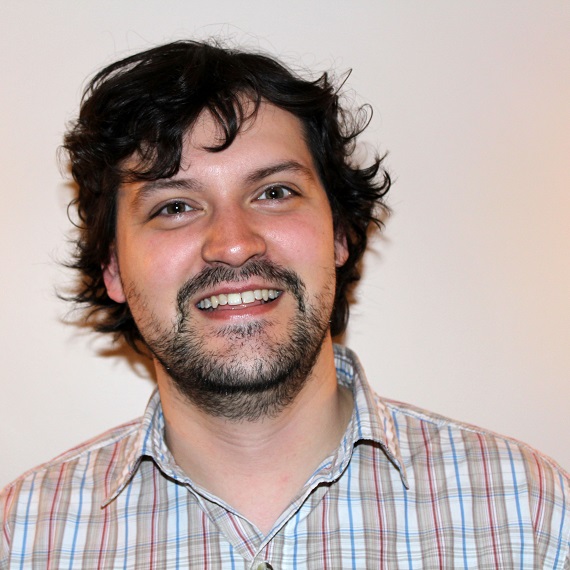Biography

Dr. Fernando Jose Bustos graduated as a Bioengineer from the University of Concepcion in 2009. He completed his undergraduate thesis work under the supervision of Dr. Brigitte van Zundert, studying the mechanisms by how NMDA receptors control structural plasticity in the brain. His thesis was recognized with the Best Undergraduate thesis award by the Chilean Society for Cell Biology in 2010. After completion of his undergraduate studies, he pursued his doctoral training at University of Concepcion studying the epigenetic mechanisms that control the expression of a key scaffolding protein in the central nervous system. His thesis was co-directed by Dr. Brigitte van Zundert and Dr. Martin Montecino. His thesis was recognized with the Best Doctorate thesis award by the Chilean Society for Cell Biology in 2014. After completing his Ph.D., he started his Postdoctoral training at the Massachusetts Institute of Technology in 2014 where he joined the laboratories of Dr. Martha Constantine-Paton and Dr. Feng Zhang. His postdoctoral training was funded by: Pew Latin American Fellowship and a Simons Center for the Social Brain Fellowship. At MIT he used CRISPR/Cas9 to study the mechanisms and brain areas involved in Autism Spectrum Disorder using animal models.
In 2019 he returned to Chile to start his independent laboratory “NeuroEditing-Lab”. He joined the recently formed Institute for Biomedical Sciences at the Universidad Andres Bello in Santiago, Chile. The same year he was awarded with Fondecyt Iniciacion and a PAI “Subvencion a la instalacion en la academia”.
Research Description
In the NeuroEditing-Lab Dr. Bustos and his team are interested in understanding the mechanisms and brain areas that are involved in Autism Spectrum Disorders (ASD). Many mutations have been associated to ASD but just a few have been confirmed with high confidence as ASD causing mutations. More research needs to be done to understand if these associated mutations cause autistic phenotypes and the mechanisms that produce them. The lab uses a combination of the gene editing technology CRISPR-Cas9 and viral approaches to knock out specific genes in whole animals. In these animals we study the synaptic defects and behaviors and determine if the produced mutations cause ASD.
In 2020 amidst the COVID19 pandemic, the lab also focused on developing new diagnostic strategies to facilitate SARS-CoV2 detection in human samples. New diagnostic tools are also being developed to decrease costs and speed up diagnostics.
Key Publications
Claudio Olmos, Gonzalo Campaña, Victor Monreal, Paola Pidal, Nannet Sanchez, Constanza Airola, Dayan Sanhueza, Patricio Tapia, Ana María Muñoz, Felipe Corvalan, Sebastian Hurtado, Claudio Meneses, Ariel Orellana, Martin Montecino, Gloria Arriagada,
Fernando Jose Bustos. SARS-CoV-2 infection in asymptomatic healthcare workers at a clinic in Chile. Plos one 16 (1), e0245913, 2021.
Pandian, JP Zhao, Y Murata, C Tunca,
FJ Bustos, R Almeida, M Constantine-Paton. Myosin Va Brain-Specific Mutation Alters Mouse Behavior and Disrupts Hippocampal Synapses. eNeuro 2020. *Corresponding Author
Fernando J. Bustos, Estibaliz Ampuero, Nur Jury, Rodrigo Aguilar, Fahimeh Falahi, Jorge Toledo, Juan Ahumada, Berta Henríquez, Miguel Guerra, Jimmy Stehberg, Rachael L. Neve, Marco Fuenzalida
, Steffen Härtel, Lorena Varela-Nallar, Marianne G. Rots, Martín Montecino, Brigitte van Zundert. Epigenetic editing of the Dlg4/PSD95 gene improves cognition in aged and Alzheimer’s disease mice. Brain 2017.
Fernando J. Bustos, Nur Jury, Pablo Martinez, Estibaliz Ampuero, Matias Campos, Sebastian Abarzúa, Karen Jaramillo, Susanne Ibing, Muriel D. Mardones, Henny Haensgen, Julia Kzhyshkowska, Maria Florencia Tevy, Rachael Neve, Magdalena Sanhueza, Lorena Varela-Nallar, Martín Montecino, Brigitte van Zundert. NMDA Receptor Subunit Composition Controls Dendritogenesis of Hippocampal Neurons through CAMKII, CREB-P and H3K27ac. Journal of Cell Physiology 2017.
Henriquez B*,
Bustos FJ*, Aguilar RA, Becerra A, Simon F, Montecino M, van Zundert B. Ezh1 and Ezh2 differentially regulate PSD-95 gene transcription in developing hippocampal neurons. Molecular and cellular neurosciences:1–14, 2013. *Authors contributed equally to this work.

